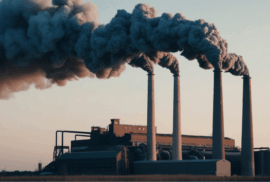Carbon capture & sequestration bills put water, Michiganders at risk

Authored by

Grace Noyola
Connect With the Experts

Charlotte Jameson

Megan Tinsley
As environmental advocates seek to advance several key priorities in the limited remaining Lame Duck window, a Senate committee took up a bill package that would enable carbon capture and sequestration technologies without putting in place sufficient protections for our water, public safety, and air quality and climate.
Senate Bills 1131, 1132 and 1133 were introduced by Senators Sean McCann (D-Kalamazoo), Joseph Bellino (R-Monroe) and John Cherry (D-Flint) in late November. The legislation would set the groundwork for a state permitting program for capturing carbon dioxide (CO2) from polluting facilities like power plants and industrial sites, compressing and transporting that CO2 using pipelines, then storing it underground.
And while reducing greenhouse gas emissions like CO2 is a key priority for Michigan’s healthy climate future, if done incorrectly these technologies pose a huge risk to human and environmental health. And with an incoming federal administration that’s not keen on regulations, it’s key to ensure state-level protections for our communities.
“Leaks from the pipelines used to transport CO2 or leaks from a sequestration site can contaminate ground and drinking water, forming carbonic acid and releasing harmful substances like arsenic and uranium,” said Megan Tinsley, water policy director for the Michigan Environmental Council. “Those leaks can come from several places in the sequestration process, and have already been seen in Illinois, where the country’s first commercial CO2 sequestration project recently had two leaks.”
In addition to potential water contamination, carbon capture also requires significant energy usage just to operate. This energy is drawn either from the plant where the capture is happening, or from an entirely separate power source—meaning that the technology can sometimes increase emissions instead of reducing them.
“To reach the clean energy goals outlined in the MI Healthy Climate Plan we need to be investing in policies and technologies that have proven, positive impacts on our net emissions,” said chief policy officer Charlotte Jameson. “Things like updating Michigan’s outdated building codes would be equivalent to removing the entire greenhouse gas emissions of over 3,200 Michigan homes—and we wouldn’t have to risk Michiganders’ health in the process.”
The Environmental Council and allies testified on these bills to oppose the rushed legislative action, calling for an expert-driven process that would address core concerns and place critical guardrails on these types of technologies, should they come to Michigan.
“To do carbon capture and sequestration in Michigan we would need significant safeguards for our water and our communities,” said Jameson. “That includes long-term site monitoring, emergency planning and preparedness, permitting legislation for the capture of emissions, requirements to prevent increased GHG emissions and more. In their current form, these bills simply don’t have any of these things.”
Discover
Power environmental change today.
Your gift to the Michigan Environmental Council is a powerful investment in the air we breathe, our water and the places we love.
Sign up for environmental news & stories.
"*" indicates required fields




